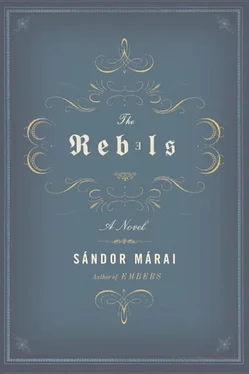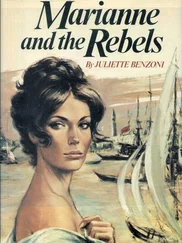THEY BEGAN STEALING AT THE BEGINNING OFNovember.
There was a short period, a few weeks in the gang’s existence, when they could amuse themselves perfectly well without money. They would meet at Ábel’s or Tibor’s place. Sometimes they could spend the whole night at Ábel’s, if they kept their heads down until his aunt had dozed off. At that early stage they didn’t need to pay for entertainment. Cash only became an issue afterwards once their experiments and exploits developed more complex requirements. Béla was the first to commit a theft.
It was he who had sought explanations and raised objections, who labored to excuse himself. No one had prevailed on him to steal but once he started making excuses, they spontaneously shouted, indeed howled him down. Béla had stolen thirty crowns from his father’s cashbox in order to buy a pair of brown, handmade, double-soled shoes he had coveted in the display of a recently opened shoe shop. He bought the shoes, brought them over to Tibor’s, tried them on, and walked about in the room for half an hour. He didn’t dare go out into the street wearing them because he was terrified at the thought of meeting his father who would notice the shoes on his feet and might get to asking where they were from.
The way things worked at his father’s big grocery store allowed Béla, once most of the assistants had been drafted and schoolkids had to be engaged to take their place, to remove money inconspicuously from the box, small sums at first, then ever larger ones. Some afternoons, when his father took a nap Béla would slip unnoticed through the gloom of the shop into the glass booth where his father kept cash in the drawer of his desk. The daily intake was substantial enough to allow his theft of ten or twenty crowns to go unremarked.
Béla worked fast. He bought himself a miscellaneous set of clothes. He was rather fastidious. One relative, the district magistrate, had hanged himself from the window catch in the third year of the war because he feared his wife and children would starve to death. His father-in-law’s shop cellars might be stacked with millstone-shaped Swiss cheeses, herring, wheat, potatoes, rice, and sardines but they failed to reassure him and the thought of starving gripped his family’s imagination. Whether at home, at table, or in the shop, Béla, who was able to take his pick of such delicacies even at times of strictest rationing, found little satisfaction in his father’s rich Canaan store. He spent the stolen money in other grocers’ shops, surreptitiously purchasing Baltic herring, Turkish delight, sardines, and anchovies in oil at inflated prices, all goods the traders had bought from his own father.
Béla was as terrified of his father as simple people are of natural disasters. The mere mention of his name left him pale and trembling. In the gang’s imagination Colonel Prockauer was one of the Fates of Ancient Greece, the Fates who could strike out of the blue and wreak universal carnage, leaving behind a flat plain and the smoke of ruins. Béla’s father was not, like him, an act of fate but part of their common, wholly undramatic lot, an ordinary accident. His bony hand would come into contact with his son’s face and administer light but very powerful blows with a cold methodical regularity, the kind delivered by people with heart problems, anxious—for the family’s sake—not to get themselves overexcited. Once he threw a knife at an apprentice boy, a great big blade he used to cut cheese with, that lay on the counter covered in cheese parings.
For a long time it was only Béla who stole. They even took care to ensure that it should be Béla alone who spent the stolen money. He had to consume the food he had bought with it in front of the others without any assistance from the gang. Ernõ sat opposite the thief, his penetrating gaze fixed on him, checking that he ate it all up, his cheeks crammed, his eyes bulging.
He hid the items of clothing he had bought at Tibor’s apartment. He bought other things too: a double-barreled shotgun, a powerful magnifying glass, an enormous papier-mâché globe, a pair of leather leggings with fine straps, a Browning revolver. It was when he bought the bicycle he never dared to ride because he didn’t know how to and because some acquaintance might see him and tell his father that the moment of decision about the hiding place arrived. The purchases were multiplying. Tibor, who was afraid that his father would suddenly turn up, no longer felt up to acting as Béla’s unclaimed luggage office. They had to get rid of the things somehow.
They began by ordering Béla about. Béla grimaced and obeyed. Within two days he was told to buy an entire fire-works display that would be thrown into the river the next evening. Ernõ was the fount of their best ideas, for example the one where Béla had to steal sixty crowns and send a bouquet of flowers to the prior at the monastery. According to the messenger, the reverend father received the gift with considerable astonishment. He blushed in embarrassment, made a clumsy bow, and stood there with the flowers in his hand, covered in confusion.
They did more than play cards at Ábel’s place. They told tales of passion, lying their heads off. The stories had to begin with the words: “This afternoon I was passing the theater when I met a sailor, the captain of a ship.” The town lay thousands of miles from any sea. They had to inquire of the sea captain how he came to be in town and what he was doing here. The extraordinary story that developed out of the meeting with the captain had to be built up, detail by detail, out of facts that could be checked or were thought to be at least credible, complete with witnesses who actually lived in town a few streets away and could testify to the truth of the narrator’s account. The core of the story was pure fantasy but the details had to be simple and clear.
They went around as a foursome. They took up the sidewalk and, at all hours of the day, would be found padding down the narrower streets like a wary military detachment, wholly preoccupied. Ernõ and Ábel took care that their exploits should be interesting and should remain within the bounds of the feasible. They fastidiously rejected certain ideas the group threw up as a whole. After a few weeks Béla too learned the ropes. Tibor, with his refined instincts, had no problems adapting to group existence. If the games and exploits they undertook had any rules, they remained unacknowledged, the only criterion being that they should have no practical use. Ernõ described their activities as self-justifying. Béla stole and bought useless things with the stolen money, clothes he would never wear and items of technical apparatus whose application was beyond his understanding.
They even came up with the idea of having some kind of gang uniform made, something they could wear at home, but they rejected it. Another time they enthusiastically agreed that they should find a tailor out of town and order garments they could never wear because they were too big, or because the trousers or the jacket were hilariously tight, all to be made from the most expensive material that could be found.
One day Ernõ brought them the address of such a tailor.
Each of them looked him up individually. Tibor ordered a tailcoat made of white sail canvas with yellow silk lining. Ernõ chose an enormous checkered suit that would have accommodated several of him, the trouser legs being attached at the ankle by means of elastic bands. Ábel ordered a cutaway coat that reached down to his heels. The one-armed one chose a suit that had no sleeves at all, the jacket smoothly stitched at the shoulders, tight and armless.
Béla decided on a simple riding costume, a scarlet hunting coat, long black trousers. He also procured spurs and a top hat. They spent hours at the tailor anxiously getting themselves measured up, measuring the tails of Ábel’s heel-length jacket to check that it should not be, even a centimeter or two, longer than it needed to be. The tailor thought they were preparing for a carnival.
Читать дальше












